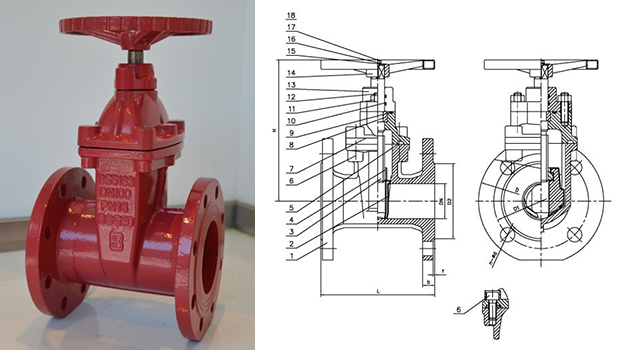1) Integral rubber-coated gate: The ductile iron skeleton is covered with high-performance rubber and the latest vulcanization technology inside and outside. 2) One-piece copper nut: The copper nut of the gate and the ductile iron gate are tightly connected as a whole by a special process to ensure that they will not loosen under long-term operation and water impact, so as to avoid the control failure of the valve. 3) Flat and low valve seat: traditional gate valves are usually recessed valve seats, which increases the fluid resistance, and is easy to accumulate welding slag, stones, sediment and other debris, which is not conducive to sealing and circulation. The bottom of the elastic seat gate valve adopts a full flow channel straight-through design, which is equivalent to a straight pipeline, and it is not easy to accumulate debris, ensuring reliable sealing and unobstructed fluid flow. 4) Lightweight structure: The compact structure reduces the maximum working height by more than 60mm to 300mm compared with the traditional gate valve, saving engineering space; the body is made of ductile iron material, and the weight is reduced by about 20% to 30% compared with the traditional gate valve, and the installation and maintenance are convenient. 5) Corrosion resistance: The inner and outer surfaces of the valve are painted with epoxy resin powder, and the inner parts are made of stainless steel and copper alloy to prevent rust and fluid corrosion. 6) Four seals are used to completely eliminate the leakage of the valve: the first seal, the upper seal of the valve stem and the valve cover, is sealed with high-quality O-rings; the second seal is between the valve cover and the valve body. Special sealing ring is used; high-quality O-ring is used between the third valve stem and the stuffing box; high-quality O-ring is used between the fourth valve stem and the packing gland. 7) The valve stem is made of high-quality stainless steel, and the hardness of the valve stem reaches HB200-275 after quenching and tempering treatment, which not only ensures the strength of the valve stem, but also increases the wear resistance of the valve stem. 8) The manual actuator is operated by hand wheel, which can be replaced by gear transmission and electric.
Overview
The opening and closing part of the dark rod elastic seat sealing gate valve is the gate, and the movement direction of the gate is perpendicular to the direction of the fluid. The gate valve can only be fully opened and fully closed, and cannot be adjusted or throttled. This valve is a replacement product of the traditional gate valve. It uses the elastic gate to compensate for slight deformation and achieves a good sealing effect. It can be widely used in tap water, sewage, construction, food, electricity, medicine, metallurgy, textile, energy systems, etc. Used as a shut-off device on fluid lines.
Main reference standards
1) Design and manufacture standard: CJ/T216-2013
2) Connection flange standard: GB/T9113-2010, GB/T17241.6-2010 (iron)
3) Structure length standard: GB/T12221-2005
4) Pressure test standard: GB/T13927-2008
Main performance parameters
|
Nominal pressure PN |
1.0 |
1.6 |
MPa |
|
Shell test |
1.5 |
2.4 |
|
|
Seal test |
1.1 |
1.76 |
|
|
Air tightness test |
0.6 |
0.6 |
|
|
proper temperature |
≤80℃ |
||
|
Applicable media |
water, oil, gas, etc. |
||
Material of main parts
|
NO |
Name |
Material |
|
1 |
Stem |
Stainless Steel |
|
2 |
O-ring seal |
EPDM |
|
3 |
Bonnet |
Ductile iron, Cast steel, Stainless steel |
|
4 |
Stem Nut |
Copper alloy |
|
5 |
Wedge disc |
Ductile iron clad EPDM |
|
6 |
Body |
Ductile iron, Cast steel, Stainless steel |
|
7 |
Open loop |
Copper alloy |
|
8 |
Gland |
Ductile iron, Cast steel, Stainless steel |
|
9 |
Handwheel |
Ductile iron, Carbon steel |
Structure
